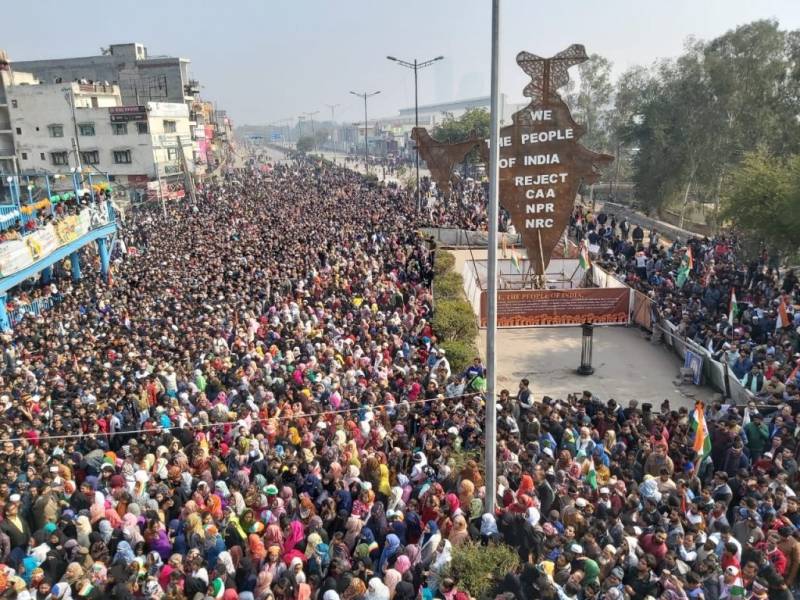
I have been to Hyde Park in London several times to hear speeches at Speakers’ Corner. On Sundays, particularly, large crowds congregate there to hear speakers haranguing the people on every topic under the sun. The police never interfere with these speeches, even if they are extremely seditious and provocative, rather, if you complain to them they will smile and say there is freedom of speech in England.
But if anyone tries to block Edgware Road or Oxford Street (at whose junction Hyde Park is situated) the police would not tolerate that for a second, as no one has the right to block roads. Even when processions are taken out in London by some people on some issue ( and this happens often ), they are accompanied by policemen who ensure that roads are not blocked and law and order is maintained.
I was therefore distressed to know of the recent order of the Indian Supreme Court appointing a senior lawyer, Mr Sanjay Hegde, to go to Shaheen Bagh In Delhi and plead to the anti CAA protesters not to block roads.
I too am against the CAA, but I see no justification for the protesters at Shaheen Bagh to have taken the law into their own hands by blocking roads near Shaheen Bagh ( e.g. Kalindi Kunj-Shaheen Bagh stretch) or catching and heckling political analyst Gunja Kapoor merely because she was in a burqa and recording videos on her mobile phone. Just because of late the protesters at Shaheen Bagh had received a lot of media attention they had become bigheads and started believing they were a law unto themselves.
The Supreme Court should have ordered the Delhi police to ensure that the roads near Shaheen Bagh were not blocked, and law and order maintained, and for this purpose use force where necessary. The Shaheen Bagh protesters had no right to hold the people of Delhi to ransom by blocking roads. There may be a medical emergency, and if a road is blocked the patient may die. For other reasons too the public may get very inconvenienced when a road is blocked.
The Supreme Court’s order is like the police pleading to a man pointing a gun at a crowd to have mercy, instead of forthwith arresting him and booking him. There are occasions when the Court must be tough, and not soft to law-breakers.
I regret to say that both the state institutions, the government and the judiciary, have failed in their solemn duty to uphold the law
But if anyone tries to block Edgware Road or Oxford Street (at whose junction Hyde Park is situated) the police would not tolerate that for a second, as no one has the right to block roads. Even when processions are taken out in London by some people on some issue ( and this happens often ), they are accompanied by policemen who ensure that roads are not blocked and law and order is maintained.
I was therefore distressed to know of the recent order of the Indian Supreme Court appointing a senior lawyer, Mr Sanjay Hegde, to go to Shaheen Bagh In Delhi and plead to the anti CAA protesters not to block roads.
I too am against the CAA, but I see no justification for the protesters at Shaheen Bagh to have taken the law into their own hands by blocking roads near Shaheen Bagh ( e.g. Kalindi Kunj-Shaheen Bagh stretch) or catching and heckling political analyst Gunja Kapoor merely because she was in a burqa and recording videos on her mobile phone. Just because of late the protesters at Shaheen Bagh had received a lot of media attention they had become bigheads and started believing they were a law unto themselves.
The Supreme Court should have ordered the Delhi police to ensure that the roads near Shaheen Bagh were not blocked, and law and order maintained, and for this purpose use force where necessary. The Shaheen Bagh protesters had no right to hold the people of Delhi to ransom by blocking roads. There may be a medical emergency, and if a road is blocked the patient may die. For other reasons too the public may get very inconvenienced when a road is blocked.
The Supreme Court’s order is like the police pleading to a man pointing a gun at a crowd to have mercy, instead of forthwith arresting him and booking him. There are occasions when the Court must be tough, and not soft to law-breakers.
I regret to say that both the state institutions, the government and the judiciary, have failed in their solemn duty to uphold the law
